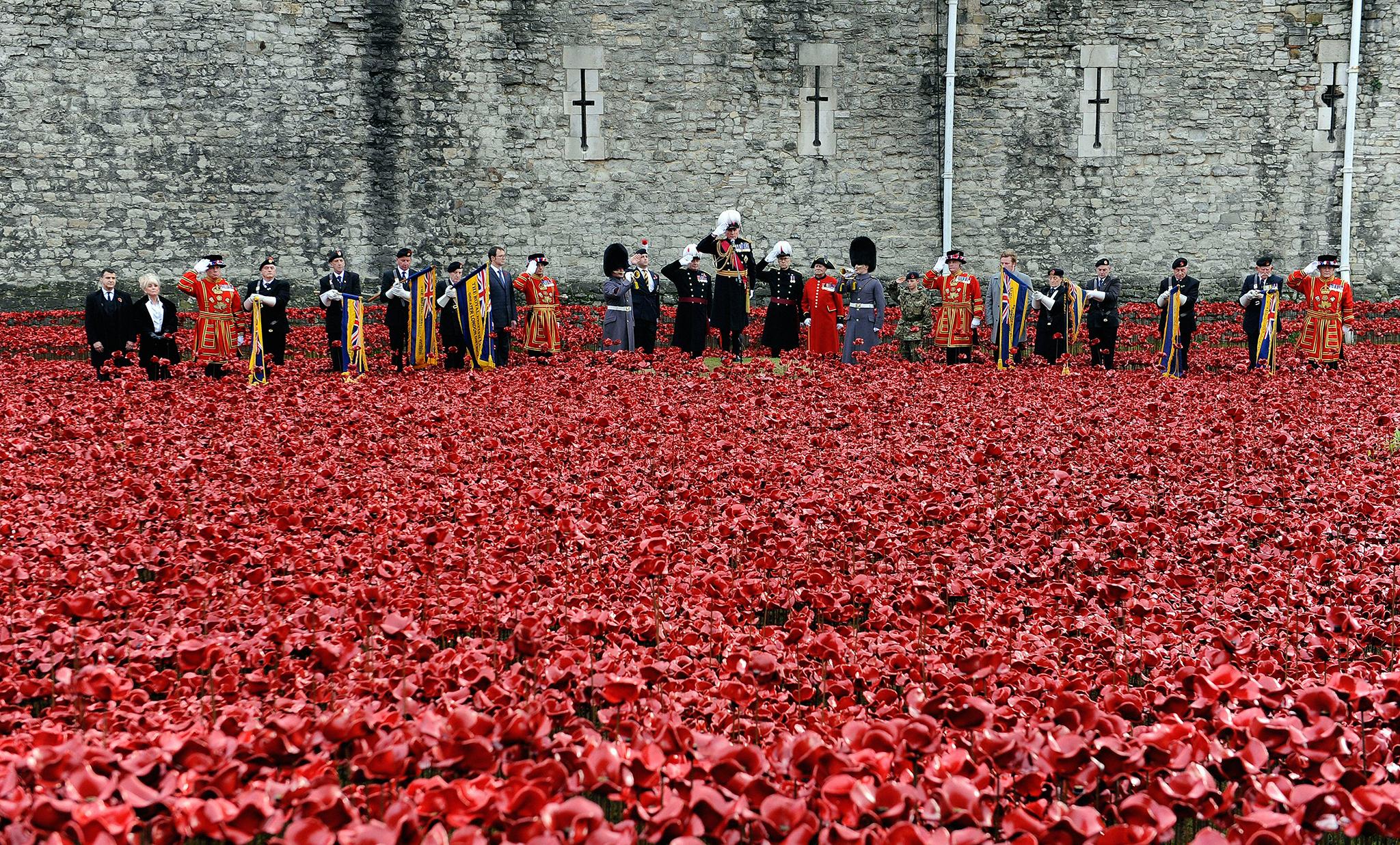The LGBT+ community put themselves in the firing line for Britain – of course there should be a rainbow poppy
There have been variations on the pin for years – why should it be any different when it comes to queer people?


Your support helps us to tell the story
From reproductive rights to climate change to Big Tech, The Independent is on the ground when the story is developing. Whether it's investigating the financials of Elon Musk's pro-Trump PAC or producing our latest documentary, 'The A Word', which shines a light on the American women fighting for reproductive rights, we know how important it is to parse out the facts from the messaging.
At such a critical moment in US history, we need reporters on the ground. Your donation allows us to keep sending journalists to speak to both sides of the story.
The Independent is trusted by Americans across the entire political spectrum. And unlike many other quality news outlets, we choose not to lock Americans out of our reporting and analysis with paywalls. We believe quality journalism should be available to everyone, paid for by those who can afford it.
Your support makes all the difference.A Brexit Party candidate has complained about a “rainbow” poppy being sold around the commemoration of Armistice Day this year. He’s claimed that the traditional poppy worn in November should be “kept outside the political frame”, attacking its use to promote LGBT+ rights. The Brexit Party is not exactly known for being friends of the LGBT+ communities, but this is a strange intervention on several counts.
His comments follow various negative references on social media to a poppy broach for sale on eBay, which doesn’t mention anything about LGBT+ people or the significance of the rainbow to them. An ex-soldier, who was equally outraged by the idea of a rainbow poppy, asked the LGBT+ community on Twitter not to “take over the one day of the year where I get to remember my friends that died for this country”. Then added: “Leave the poppy alone and have some respect.”
Ignoring the fact that the wearing of a red poppy has been considered a political act in the past, the rainbow poppy isn’t really a thing: the outrage is manufactured and the abuse itself politically motivated. There have been variations on the red poppy for years. Those who don’t believe in war but who wish to honour the war dead wear a white poppy as a symbol of the end of all war, black poppies have been used to remember Bame soldiers and purple to commemorate the contributions of animals in war. So, perhaps the Brexit Party candidate and those attacking the idea of a rainbow poppy have done us a service. There should be a rainbow poppy and it should be worn with pride.
During both world wars and in conflicts since, countless gay, lesbian, bisexual and trans people fought and were killed on all sides, but in Britain gay and bisexual men were putting themselves in the firing line for a country that criminalised them. Gay men in the trenches in the First World War and on the beaches of Normandy, the sands of north Africa and the jungles of southeast Asia in the Second World War were in constant danger not just from bullets and bombs but from the military police. Technically, they could be executed under military law if found out. They could certainly expect a long prison sentence with hard labour and the disgrace of a dishonourable discharge, earning the lifelong hatred of their communities. LGBT+ people still could not serve in the military until 2000.
A recent film, Moffie, explores the appalling treatment of gay soldiers in the South African army during the apartheid regime. Vicious beatings, phoney psychiatric treatment, depression and alienation are the result, and while it may be making a point about a particularly nasty system, the sort of brutality meted out to gay or bisexual soldiers could be found in almost any armed forces. And yet LGBT+ people have continued to serve.
Ian Gleed, an ace fighter pilot in 1940, made hundreds of sorties during the Battle of Britain and was eventually shot down and killed over North Africa in 1943. He loved men but was persuaded by his friends to invent an entirely fictitious girlfriend for a public memoir, who received letters of condolence after his death.
The First World War poet Wilfred Owen discovered a world of gay liberation during his time as a junior officer, writing poetry that not only defined the modern relationship with war but shivered with homoerotic suggestion. He too was shot dead crossing a canal just a few days before the Armistice in 1918. A great many of his fellow war poets were gay or bisexual: Siegfried Sassoon, Rupert Brooke, Ivor Gurney, Charles Sorley, even Robert Graves for a time. They all loved men. They fought bravely when they could and several were killed either directly or indirectly for the war effort.
Prince George, Duke of Kent, brother of the king and lover of the playwright Noel Coward, took a position as a lowly staff officer in the air force when war broke out in 1939 so he could be on active duty. He died in a plane crash in 1942, an accident that has been shrouded in mystery with questions asked whether or not the prince was on an official mission. The trans writer Jan Morris was an intelligence officer in the latter stages of the Second World War, working in northern Italy and Palestine. She wrote later: “At last, in the army of all places, I felt I was free.”’
Lesbian women also found new purpose in the armed forces during the wars. In early 1940 a Women’s Auxiliary Air Force WAAF report noted that women-on-women action amongst the ranks was sort of inevitable: “Naturally, it is a vice that is going to be impossible to keep out of the WAAF altogether.”
Toupie Lowther, a tennis ace and fencing star before 1914, took the initiative when war broke out to set up an all-women ambulance unit under the command of the French, racing between the front line and various field hospitals, often under fire from howitzers and machine guns, dressed in trench coats and trench boots. Known as “Brother” to her friends and decorated by the French state, Lowther was outed by Radclyffe Hall, who incorporated details of her life as a swashbuckling ambulance driver in her book The Well of Loneliness, details which were used by the prosecutors of the novel in 1928.
Thousands of men and women thrown together, sharing dugouts, blankets, brief joys and longer miseries could not do so without intimacies cropping up, however they manifested themselves in crushes, flushes or passing brushes on a mud-caked boardwalk or a bleak arc-lit corridor of the ministry. Men and women would find a way.
But that way could also be tragic and deadly. Edward Brittain, the brother of the writer Vera, had been among the first to sign up from school in 1914. He fought bravely at the Somme and Passchendaele hoping to end his war in the supposedly calmer front amongst the mountains of northern Italy. But it wasn’t to be. Warned by his commanding officer that he was under investigation for unspecified sexual misconduct with another man – a compromising letter he had written to another officer had fallen into the hands of the military police – he likely put himself in the way of a bullet the following day during a battle to gain some small piece of rock below the Asiago Plateau in the summer of 1918 rather than face a court martial and the terrible exposure it would entail for him and his family.
As one man who had fought in the Second World War said later: “They used us when it suited them, and then victimised us when the country was no longer in danger.”
So, why shouldn’t the rainbow poppy be a real thing? Why shouldn’t it be worn with pride on Remembrance Day by everyone who wants to commemorate the sacrifice of the LGBT+ community? Our kinds have fought and died as bravely as anyone else over the centuries of warfare and gained the medals to prove it. And they’ve done it in the teeth of the sort of hostility at home that would cause the bravest of straight men or women to think twice. To deny that, as those who’ve objected to the idea of a rainbow poppy have tried to, is more of a political act – an act, you could say, of cowardice – than wearing a rainbow poppy itself.
Join our commenting forum
Join thought-provoking conversations, follow other Independent readers and see their replies
Comments